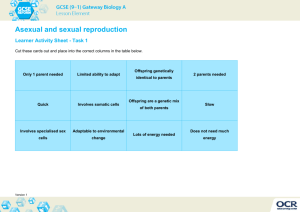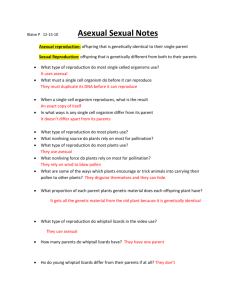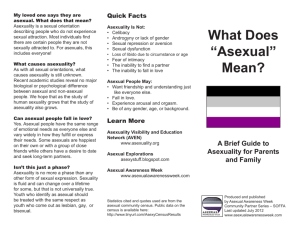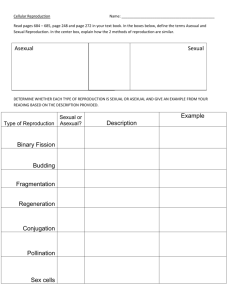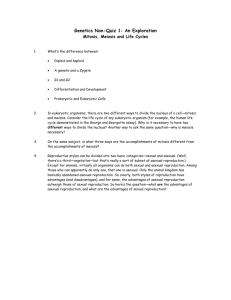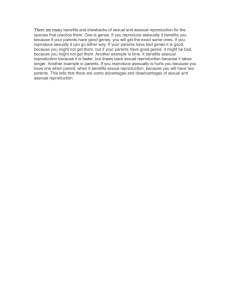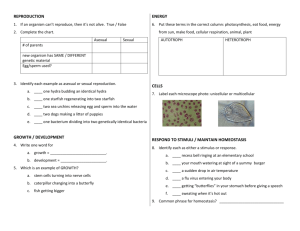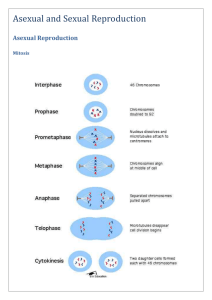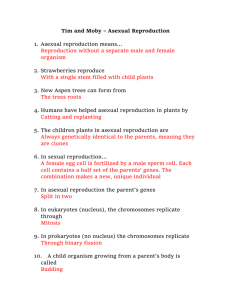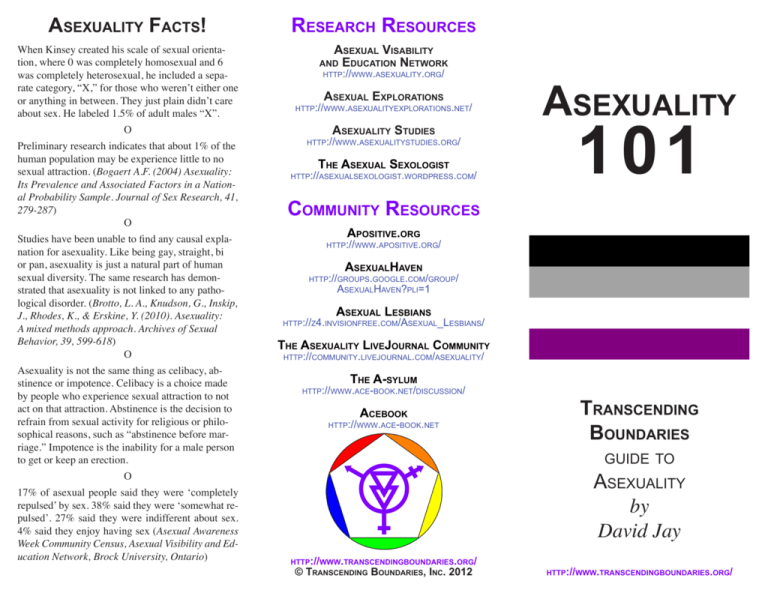
Asexuality Facts!
When Kinsey created his scale of sexual orientation, where 0 was completely homosexual and 6
was completely heterosexual, he included a separate category, “X,” for those who weren’t either one
or anything in between. They just plain didn’t care
about sex. He labeled 1.5% of adult males “X”.
O
Preliminary research indicates that about 1% of the
human population may be experience little to no
sexual attraction. (Bogaert A.F. (2004) Asexuality:
Its Prevalence and Associated Factors in a National Probability Sample. Journal of Sex Research, 41,
279-287)
O
Studies have been unable to find any causal explanation for asexuality. Like being gay, straight, bi
or pan, asexuality is just a natural part of human
sexual diversity. The same research has demonstrated that asexuality is not linked to any pathological disorder. (Brotto, L. A., Knudson, G., Inskip,
J., Rhodes, K., & Erskine, Y. (2010). Asexuality:
A mixed methods approach. Archives of Sexual
Behavior, 39, 599-618)
O
Asexuality is not the same thing as celibacy, abstinence or impotence. Celibacy is a choice made
by people who experience sexual attraction to not
act on that attraction. Abstinence is the decision to
refrain from sexual activity for religious or philosophical reasons, such as “abstinence before marriage.” Impotence is the inability for a male person
to get or keep an erection.
Research Resources
Asexual Visability
and Education Network
http://www.asexuality.org/
Asexual Explorations
http://www.asexualityexplorations.net/
Asexuality Studies
http://www.asexualitystudies.org/
The Asexual Sexologist
http://asexualsexologist.wordpress.com/
Community Resources
101
Apositive.org
http://www.apositive.org/
AsexualHaven
http://groups.google.com/group/
AsexualHaven?pli=1
Asexual Lesbians
http://z4.invisionfree.com/Asexual_Lesbians/
The Asexuality LiveJournal Community
http://community.livejournal.com/asexuality/
The A-sylum
http://www.ace-book.net/discussion/
Acebook
http://www.ace-book.net
Transcending
Boundaries
guide to
O
17% of asexual people said they were ‘completely
repulsed’ by sex. 38% said they were ‘somewhat repulsed’. 27% said they were indifferent about sex.
4% said they enjoy having sex (Asexual Awareness
Week Community Census, Asexual Visibility and Education Network, Brock University, Ontario)
Asexuality
Asexuality
by
David Jay
http://www.transcendingboundaries.org/
© Transcending Boundaries, Inc. 2012
http://www.transcendingboundaries.org/
Asexuality 101
An asexual is someone who does not experience
sexual attraction. This means that they do not have
an intrinsic desire to have sex with others.
The word “asexual” is a tool, not a label. If it helps
you understand yourself and explain yourself to others then you should pick it up and use it, if it stops
making sense you can always put it down. Visit the
community on asexuality.org, read people’s stories,
and see if they resonate with you. You’re more complicated than any one word, focus on understanding
yourself first and on the words second.
How do I know if I’m asexual?
Many asexual people start out experiencing a sense
of alienation around sexuality. They do not understand why their friends fixate on sex, and they find
sexual acts dull or uncomfortable. Because our society delivers negative messages about people who
are uninterested in or unable to have sex, some asexual people feel broken.
Asexual people who have had more time to become
comfortable with themselves have often found ways
to have nonsexual intimacy replace sexual intimacy
as a source of emotional support and fulfillment.
They are generally com-fortable around sex so long
as no one expects them to desire it.
No one can tell you whether or not you are asexual.
if the word “asexual” and the asexual community
are useful tools to help you figure yourself out, pick
them up and use them. If they ever stop being useful
tools, you can put them down and no one from the
asexual community will judge you. Your experiences may or may not align with those described above;
it is up to you to decide whether the term “asexual”
fits your experience.
Can asexual people fall in love?
Yes. Love and sex are different things, and asexual
people are as capable of experiencing love as any-
one else. For many asexual people, love happens in
romantic partnerships which rely on powerful nonsexual ways to express intimacy. For other asexual
people love happens primarily in close friendships,
in community ties, or in relationships with self.
Emotional intimacy is complex and multi-faceted,
and the ways that asexual people find it are complicated and diverse. each asexual person must explore
intimate relationships on her, his,
or hir own terms.
Can asexual people have sex?
Yes. Asexuality is different from celibacy, an asexual can have sex and still be asexual in much the
same way that a lesbian can have sex with a man and
still be a
lesbian. this
is a complicated issue
and generally
occurs in romantic relationships between
sexual and asexual people. many
successful sexual/
asexual
relationships do not involve
sex, and in those that
do sex often plays a different role than it would
in a relationship between two sexual people.
Physically, most asexual people are capable of experiencing sexual arousal. Some asexual people describe this arousal as “not attached to anything.” It
exists but is not associated with the desire to have
sex with a partner. some asexual people masturbate.
How can I be supportive of asexual people?
Asexual people often struggle with a “sexual imperative”: the assumption that everyone needs sex
to be happy. Sexual people who are allies of the
asexual community can be supportive by calling out
and questioning this assumption, and by celebrating
fulfillment through nonsexual intimacy alongside
celebrations of sexuality. sexual allies can continue
to openly discuss and celebrate their sexuality so
long as they create safe spaces for asexual people to
do the same.
How do asexual people view sex?
Most asexual people think sex is great for people
who desire it. We generally think it’s great to celebrate sex as one of many ways to experience intimacy, power, and physical connection, so long as it’s
not held up as the only way to access those things.
Sometimes asexual people are frustrated at a culture
which tells us we need sex to be happy, but that is
different from being frustrated with sex or people
who enjoy it.
Why do we need an asexual community?
You might decide that an asexual community has no
value to you, but other asexuals receive a great deal
from sharing their experiences with each other.
There are many different things you could take from
an asexual community. Some members wish to talk
to others with similar experiences, some wish to explore the diversity of experience within the community. Some want to talk about finding romance, some
enjoy discussing the vast possibilities for asexual relationships. Some people would like to learn how
to be more comfortable with their asexuality, others
are eager to celebrate what they are. Some want to
make things better for future asexuals, some want to
spread the word that asexuality exists and it’s OK
to be that way. Some asexuals want to discuss the
theory of asexuality and sexuality, some just want to
tell jokes or share poems and stories.
The asexual community might be for you, or it might
not. If you think you might benefit from hearing the
experiences of people with little or no sexual attraction to other people, then you should give it a try.
Is asexuality inherently queer?
This has been the subject of much debate and discussion. On the one hand ‘queer’ is ‘anything that
differs from the norm’, especially the norm of sexuality, and there are asexuals that consider the relationships they form to be completely unconventional and therefore queer. Other asexuals consider their
relationships to be entirely conventional and do not
identify as queer in any way.


